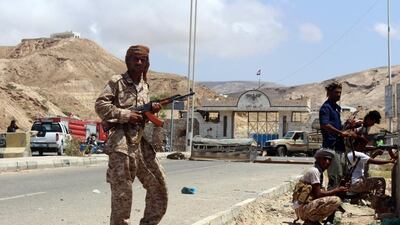Kuwait City // Yemen’s warring parties have discussed forming military and security committees to oversee a transition period aimed at ending more than a year of fighting, the UN special envoy said on Wednesday.
“Discussions continued on security and military issues, including the details of military and security committees,” Ismail Ould Cheikh Ahmed said.
Peace talks in Kuwait between Iran-backed rebels and the internationally recognised government of Abdrabu Mansur Hadi have completed their eighth week without any major breakthrough other than the release of some prisoners.
Shiite Houthi rebels have announced the release of 187 prisoners and Saudi Arabia, which backs Mr Hadi’s administration, said last week it freed 52 children.
The UN envoy had tried to push the two sides to release half of all their prisoners before the holy month of Ramadan.
The main sticking point in talks remains the form of the government that would oversee a transition back to normality once a peace deal is reached.
The rebels and their allies have held out against demands contained in a UN Security Council resolution for their surrender of heavy weaponry and withdrawal from areas, including the capital, which they seized in September 2014.
The head of the Houthi delegation Mohammed Abdulsalam said on Tuesday that they would reject any deal that does not include their input on the make-up of the transitional body.
“Any deal that does not meet our demands of forming a consensual authority ... will be rejected,” Mr Abdulsalam said.
This should include Houthi agreement on the president, the national unity government and military and security committees, he said.
The government has resisted proposals for a unity administration with the rebels, fearing it would undermine the legitimacy of Mr Hadi.
Meanwhile, security officials in Yemen said that fighting on several fronts killed at least 48 people yesterday.
Some 65 people were wounded around the besieged city of Taiz as well as in Shabwa, Jawf and Marib provinces.
The fighting in Yemen has pitted the Iran-backed Houthis against Mr Hadi’s forces, which are backed by an Arab coalition led by Saudi Arabia.
On Tuesday, aid group Doctors Without Borders said that despite a truce in Yemen, civilians continue to be severely affected by violence in Taiz.
Yemen’s war has killed more than 6,400 people, with more than 80 per cent of the population in desperate need of humanitarian aid, according to the UN.
*Agence France-Presse and Associated Press

